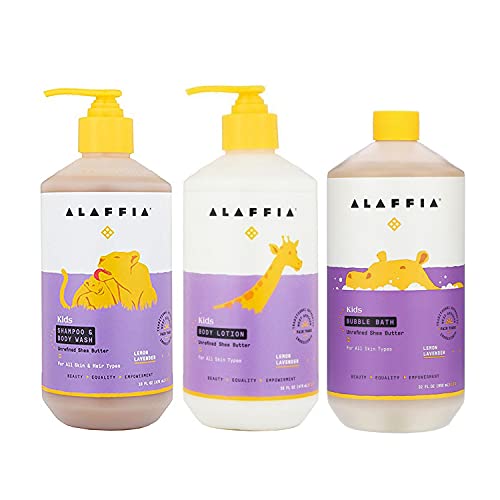
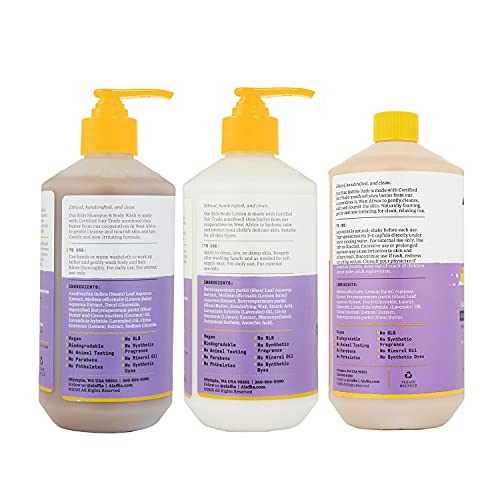
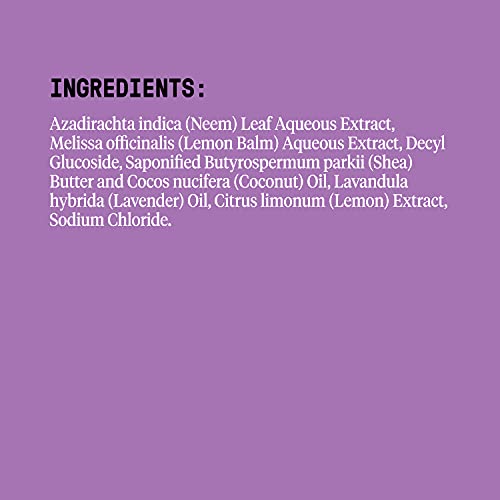
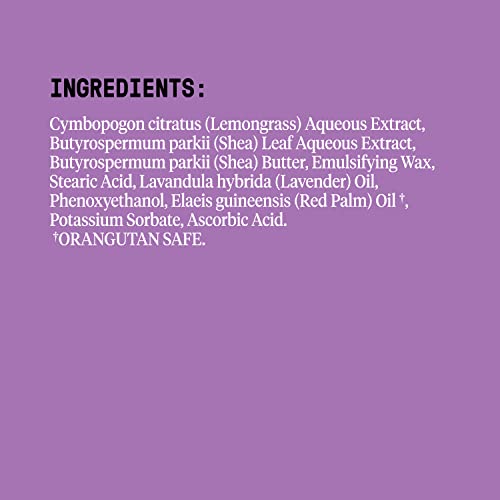
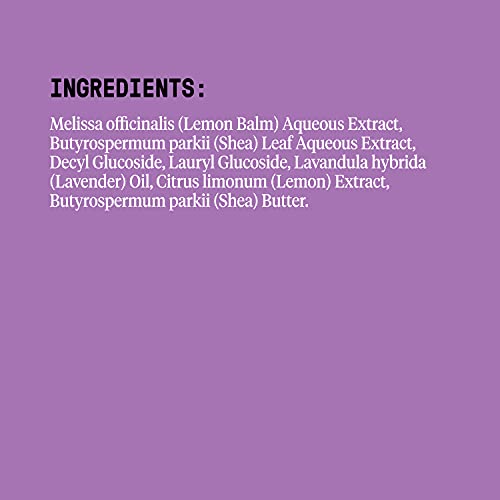
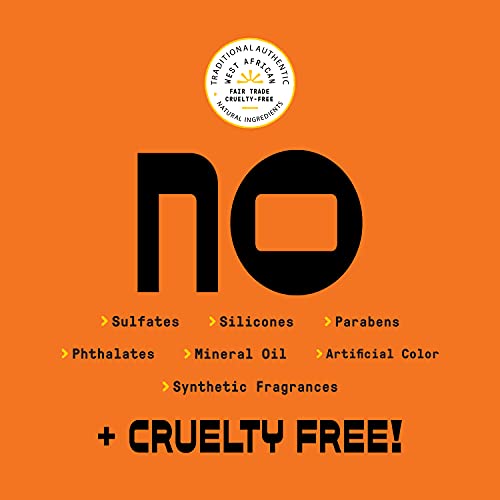

Alaffia Kids Shampoo & Body Wash Set - Nourishing, Gentle with Shea Butter & Coconut Oil - 64oz


Behentrimonium Chloride
High RiskBehentrimonium chloride is a quaternary ammonium compound primarily used as a conditioning agent in hair and skin care products. It functions as an emulsifier and surfactant, helping to improve texture and manageability of hair.
Sustai Insights
Behentrimonium chloride offers functional benefits as a hair conditioner and emulsifier. However, it is associated with moderate allergenic potential and has high use restrictions due to regulatory concerns. It poses low risks for carcinogenicity and developmental toxicity but has been noted for neurotoxicity. Environmental risks include potential pollution and low biodegradability. Overall, the ingredient is assessed as high risk, and users should consider alternatives such as natural conditioners.
Emulsifying Wax
Medium RiskEmulsifying wax is a mixture derived from plant and synthetic sources, primarily used to stabilize emulsions in cosmetic and personal care products. Its primary function is to blend oil and water-based ingredients, ensuring a uniform consistency and enhancing product texture.
Sustai Insights
Emulsifying wax offers functional benefits as an effective emulsifier, helping to create stable formulations in cosmetic products. It generally poses low health risks, with minimal concerns regarding carcinogenicity and allergenic potential. Environmental risks are also low, with no significant pollutant or bioaccumulation issues. However, use restrictions exist, and irritation potential is noted for sensitive skin. Regulatory assessments indicate it is safe for use within established concentration limits, leading to an overall moderate risk assessment. Alternatives like plant-based emulsifiers may offer sustainable options.
Phenoxyethanol
Medium RiskPhenoxyethanol is a preservative used in cosmetics and personal care products to prevent microbial growth and extend shelf life. It is commonly found in formulations such as lotions, creams, and serums.
Sustai Insights
Phenoxyethanol serves effectively as a preservative, ensuring product stability and safety by inhibiting microbial growth. It is considered to have low health risks regarding carcinogenicity, allergies, and reproductive toxicity. However, moderate use restrictions exist, and regulatory bodies have advised caution in specific applications. Environmental concerns include its potential as a pollutant, although it is not highly bioaccumulative. Overall, the ingredient presents a medium risk level, with safe usage practices recommended and alternative preservatives available for those seeking greener options.
Potassium Sorbate
Medium RiskPotassium sorbate is a potassium salt of sorbic acid, primarily used as a preservative in food and cosmetic products. It inhibits the growth of molds, yeast, and some bacteria, extending the shelf life of products. It is commonly found in various formulations due to its effectiveness and low toxicity.
Sustai Insights
Potassium sorbate serves as an effective preservative, preventing microbial growth in food and cosmetic products, which is vital for safety and longevity. Although it has a low risk of carcinogenicity and developmental toxicity, there is a moderate concern regarding allergies and immunotoxicity. Environmentally, it poses minimal risks as it is not significantly bioaccumulative. Regulatory agencies have verified its use, although some products may face restrictions. Overall, it is assessed as a medium risk ingredient, with safe usage practices recommended, and alternatives such as natural preservatives could be considered.
Citrus Limon (Lemon)
Low RiskCitrus limon, commonly known as lemon, is a citrus fruit used primarily for its juice and zest. It is often included in personal care products for its astringent properties and as a natural fragrance. It is recognized for its potential antioxidant benefits and as a source of vitamin C.
Sustai Insights
Citrus limon offers functional benefits like acting as a natural preservative and providing fragrance in formulations. It is sustainably sourced and biodegradable. Health risks are considered low for carcinogenicity, allergies, and reproductive toxicity. Environmental risks are minimal, with no significant bioaccumulation. Regulatory status is favorable, with no current restrictions noted. Overall, this ingredient poses a low risk, making it a safe choice for consumers.
Butyrospermum Parkii (Shea) Butter
Low RiskButyrospermum parkii (shea) butter is a vegetable fat derived from the nuts of the shea tree. It is commonly used in cosmetic formulations for its emollient properties, providing moisture and improving skin texture. Additionally, shea butter is known for its ability to enhance the stability of products and deliver a creamy texture.
Sustai Insights
Shea butter offers functional benefits as an effective moisturizer, enhancing skin barrier function and texture. It is sustainably sourced and biodegradable, contributing to eco-friendliness. Health-wise, it is associated with low risks for carcinogenicity, allergies, and reproductive toxicity. Environmental impacts are minimal, with no significant pollutant potential identified. Regulatory assessments indicate no current restrictions. Overall, the ingredient presents a low risk, making it a favorable choice in cosmetic formulations.
Caprylyl/ Capryl Glycoside
Low RiskCaprylyl/Capryl Glycoside is a surfactant derived from natural sources, primarily used in personal care and cosmetic products for its emulsifying properties. It helps to stabilize formulations and enhance cleaning efficacy while being gentle on the skin.
Sustai Insights
Caprylyl/Capryl Glycoside offers functional benefits as a mild surfactant and emulsifier, contributing to product stability without significant irritation. It is biodegradable and considered sustainably sourced. Health risks are low, with minimal concerns regarding carcinogenicity and developmental toxicity. Environmental impact is also low, as it does not accumulate in ecosystems. Regulatory assessments indicate no current restrictions. Overall, it presents a low risk profile, making it a suitable choice in formulations.
Panthenol, D
Low RiskPanthenol, also known as provitamin B5, is a humectant commonly used in cosmetic and personal care products. It functions primarily as a moisturizer, enhancing skin hydration and improving the appearance of hair by imparting shine and softness.
Sustai Insights
Panthenol is effective in retaining moisture, thus providing functional benefits for skin and hair care products. It is generally recognized as safe, with low concerns regarding carcinogenicity, allergies, and developmental toxicity. However, potential cumulative exposure from multiple sources exists. Environmental risks are minimal, and it is not bioaccumulative. Regulatory bodies have not issued significant warnings; therefore, the overall risk level is assessed as low. For optimal use, it is recommended to follow product guidelines, and alternatives such as glycerin may also be considered for moisturizing effects.
Decyl Glucoside
Low RiskDecyl glucoside is a glucose-based surfactant derived from natural sources, primarily used as a mild cleansing agent in personal care products. It effectively reduces surface tension, allowing for improved mixing of ingredients and enhanced cleansing properties without stripping natural oils from the skin.
Sustai Insights
Decyl glucoside offers functional benefits as a non-ionic surfactant, making it suitable for sensitive skin formulations. It is biodegradable and derived from renewable resources, supporting sustainability. Health risks are primarily low, with minimal concerns regarding irritation and allergies. Environmental risks are low, as it does not significantly contribute to pollution or bioaccumulation. Regulatory status is generally favorable, with low restrictions noted. Overall, decyl glucoside presents a low risk for use in consumer products, making it a suitable choice for gentle formulations.
Sodium Bicarbonate
Low RiskSodium bicarbonate, commonly known as baking soda, is an inorganic compound with the formula NaHCO₃. It functions primarily as a leavening agent in baking, helping to produce carbon dioxide gas when it reacts with acids, thereby causing dough to rise. It also serves as a mild alkaline agent in various personal care products.
Sustai Insights
Sodium bicarbonate is valued for its effectiveness as a leavening agent and its role in neutralizing acidity, contributing to product stability. It is considered environmentally friendly and biodegradable. Health risks are minimal, with low concerns regarding carcinogenicity, allergies, and reproductive toxicity. It is not classified as a pollutant and poses no significant environmental hazards. Regulatory assessments indicate it is safe for use in food and cosmetic products. Overall, sodium bicarbonate carries a low risk, making it a practical choice in many applications.
Cocos Nucifera Fruit Extract
Low RiskCocos Nucifera Fruit Extract is an extract derived from the fruit of the coconut palm, commonly used in cosmetic formulations for its moisturizing properties. It serves primarily as a skin conditioning agent, contributing to product texture and hydration.
Sustai Insights
Cocos Nucifera Fruit Extract offers functional benefits such as effective skin hydration and conditioning, with sustainable sourcing potential. Scientific assessments indicate low health risks, including minimal concerns for carcinogenicity, allergies, and reproductive toxicity. Environmental impacts are also low, with no significant bioaccumulation or pollution concerns. Regulatory bodies do not impose restrictions on its use, leading to an overall low-risk classification. Safe usage practices include patch testing for sensitive individuals. Alternatives like shea butter or other plant-based extracts may be considered for similar benefits.
Cetearyl Alcohol
Low RiskCetearyl alcohol is a mixture of cetyl and stearyl alcohol, primarily used as an emulsifier and thickener in cosmetic formulations. It helps stabilize products, improve texture, and enhance moisturizing properties, making it common in creams and lotions.
Sustai Insights
Cetearyl alcohol offers functional benefits as an effective emulsifier and skin-conditioning agent, contributing to product stability and texture. It is generally recognized as safe, with low concerns for carcinogenicity, allergies, or reproductive toxicity. Environmental risks are minimal, as it is biodegradable and has low pollutant potential. Regulatory bodies have not imposed significant restrictions on its use. Overall, cetearyl alcohol is assessed to carry low risk, making it a suitable ingredient choice in cosmetic products.
Sea Salt
Low RiskSea salt is a mixture of inorganic salts derived primarily from the evaporation of seawater. It consists mainly of sodium chloride, with minor amounts of other minerals. Sea salt is commonly used as a seasoning and preservative in food products and may also have applications in cosmetics and personal care items.
Sustai Insights
Sea salt serves as an effective flavor enhancer and preservative, contributing to the taste and shelf-life of food products. It is generally considered safe with low risk for health concerns such as cancer, allergies, and reproductive toxicity. Environmental impact is minimal, as it does not contribute significantly to pollution or bioaccumulation. Regulatory bodies, including the FDA, currently do not impose restrictions on its use. Overall, the risk level associated with sea salt is low, making it a widely accepted ingredient with no significant adverse effects reported.
Cocos Nucifera (Coconut) Oil
Low RiskCocos Nucifera (Coconut) Oil is derived from the kernels of the coconut palm. It is primarily used in cosmetic formulations for its emollient and moisturizing properties, making it suitable for skin and hair care products.
Sustai Insights
Coconut oil serves as an effective moisturizer and emollient, promoting skin hydration and softness. It is sustainably sourced and biodegradable. Health risks are minimal, with low concerns regarding carcinogenicity, allergens, and reproductive toxicity. Environmental impact is also low, as it does not contribute significantly to pollution or bioaccumulation. Regulatory bodies have not issued restrictions on its use. Overall, coconut oil presents a low risk for health and environmental concerns, making it a safe ingredient in cosmetic products.
Stearic Acid
Low RiskStearic acid is a naturally occurring fatty acid commonly found in animal and vegetable fats. It functions primarily as an emulsifier, thickener, and stabilizer in cosmetic and personal care products, providing texture and consistency.
Sustai Insights
Stearic acid offers functional benefits such as effective emulsification and stabilization of formulations. It is derived from renewable sources and is biodegradable, contributing to its sustainability profile. Health risks are low, with minimal concerns regarding carcinogenicity, allergies, or reproductive toxicity. Environmental risks are also low, with no significant pollutants or bioaccumulation concerns noted. Regulatory bodies, including the FDA, do not impose restrictions on its use. Overall, stearic acid is assessed as low risk, and its safe usage practices are well-established, with no significant alternatives needed.
Citrus Limon (Lemon)
Low RiskCitrus limon, commonly known as lemon, is a citrus fruit used primarily for its juice and zest. It is often included in personal care products for its astringent properties and as a natural fragrance. It is recognized for its potential antioxidant benefits and as a source of vitamin C.
Sustai Insights
Citrus limon offers functional benefits like acting as a natural preservative and providing fragrance in formulations. It is sustainably sourced and biodegradable. Health risks are considered low for carcinogenicity, allergies, and reproductive toxicity. Environmental risks are minimal, with no significant bioaccumulation. Regulatory status is favorable, with no current restrictions noted. Overall, this ingredient poses a low risk, making it a safe choice for consumers.
Butyrospermum Parkii (Shea) Butter
Low RiskButyrospermum parkii (shea) butter is a vegetable fat derived from the nuts of the shea tree. It is commonly used in cosmetic formulations for its emollient properties, providing moisture and improving skin texture. Additionally, shea butter is known for its ability to enhance the stability of products and deliver a creamy texture.
Sustai Insights
Shea butter offers functional benefits as an effective moisturizer, enhancing skin barrier function and texture. It is sustainably sourced and biodegradable, contributing to eco-friendliness. Health-wise, it is associated with low risks for carcinogenicity, allergies, and reproductive toxicity. Environmental impacts are minimal, with no significant pollutant potential identified. Regulatory assessments indicate no current restrictions. Overall, the ingredient presents a low risk, making it a favorable choice in cosmetic formulations.
Behentrimonium Chloride
High RiskBehentrimonium chloride is a quaternary ammonium compound primarily used as a conditioning agent in hair and skin care products. It functions as an emulsifier and surfactant, helping to improve texture and manageability of hair.
Sustai Insights
Behentrimonium chloride offers functional benefits as a hair conditioner and emulsifier. However, it is associated with moderate allergenic potential and has high use restrictions due to regulatory concerns. It poses low risks for carcinogenicity and developmental toxicity but has been noted for neurotoxicity. Environmental risks include potential pollution and low biodegradability. Overall, the ingredient is assessed as high risk, and users should consider alternatives such as natural conditioners.
Caprylyl/ Capryl Glycoside
Low RiskCaprylyl/Capryl Glycoside is a surfactant derived from natural sources, primarily used in personal care and cosmetic products for its emulsifying properties. It helps to stabilize formulations and enhance cleaning efficacy while being gentle on the skin.
Sustai Insights
Caprylyl/Capryl Glycoside offers functional benefits as a mild surfactant and emulsifier, contributing to product stability without significant irritation. It is biodegradable and considered sustainably sourced. Health risks are low, with minimal concerns regarding carcinogenicity and developmental toxicity. Environmental impact is also low, as it does not accumulate in ecosystems. Regulatory assessments indicate no current restrictions. Overall, it presents a low risk profile, making it a suitable choice in formulations.
Panthenol, D
Low RiskPanthenol, also known as provitamin B5, is a humectant commonly used in cosmetic and personal care products. It functions primarily as a moisturizer, enhancing skin hydration and improving the appearance of hair by imparting shine and softness.
Sustai Insights
Panthenol is effective in retaining moisture, thus providing functional benefits for skin and hair care products. It is generally recognized as safe, with low concerns regarding carcinogenicity, allergies, and developmental toxicity. However, potential cumulative exposure from multiple sources exists. Environmental risks are minimal, and it is not bioaccumulative. Regulatory bodies have not issued significant warnings; therefore, the overall risk level is assessed as low. For optimal use, it is recommended to follow product guidelines, and alternatives such as glycerin may also be considered for moisturizing effects.
Decyl Glucoside
Low RiskDecyl glucoside is a glucose-based surfactant derived from natural sources, primarily used as a mild cleansing agent in personal care products. It effectively reduces surface tension, allowing for improved mixing of ingredients and enhanced cleansing properties without stripping natural oils from the skin.
Sustai Insights
Decyl glucoside offers functional benefits as a non-ionic surfactant, making it suitable for sensitive skin formulations. It is biodegradable and derived from renewable resources, supporting sustainability. Health risks are primarily low, with minimal concerns regarding irritation and allergies. Environmental risks are low, as it does not significantly contribute to pollution or bioaccumulation. Regulatory status is generally favorable, with low restrictions noted. Overall, decyl glucoside presents a low risk for use in consumer products, making it a suitable choice for gentle formulations.
Sodium Bicarbonate
Low RiskSodium bicarbonate, commonly known as baking soda, is an inorganic compound with the formula NaHCO₃. It functions primarily as a leavening agent in baking, helping to produce carbon dioxide gas when it reacts with acids, thereby causing dough to rise. It also serves as a mild alkaline agent in various personal care products.
Sustai Insights
Sodium bicarbonate is valued for its effectiveness as a leavening agent and its role in neutralizing acidity, contributing to product stability. It is considered environmentally friendly and biodegradable. Health risks are minimal, with low concerns regarding carcinogenicity, allergies, and reproductive toxicity. It is not classified as a pollutant and poses no significant environmental hazards. Regulatory assessments indicate it is safe for use in food and cosmetic products. Overall, sodium bicarbonate carries a low risk, making it a practical choice in many applications.
Cocos Nucifera Fruit Extract
Low RiskCocos Nucifera Fruit Extract is an extract derived from the fruit of the coconut palm, commonly used in cosmetic formulations for its moisturizing properties. It serves primarily as a skin conditioning agent, contributing to product texture and hydration.
Sustai Insights
Cocos Nucifera Fruit Extract offers functional benefits such as effective skin hydration and conditioning, with sustainable sourcing potential. Scientific assessments indicate low health risks, including minimal concerns for carcinogenicity, allergies, and reproductive toxicity. Environmental impacts are also low, with no significant bioaccumulation or pollution concerns. Regulatory bodies do not impose restrictions on its use, leading to an overall low-risk classification. Safe usage practices include patch testing for sensitive individuals. Alternatives like shea butter or other plant-based extracts may be considered for similar benefits.
Emulsifying Wax
Medium RiskEmulsifying wax is a mixture derived from plant and synthetic sources, primarily used to stabilize emulsions in cosmetic and personal care products. Its primary function is to blend oil and water-based ingredients, ensuring a uniform consistency and enhancing product texture.
Sustai Insights
Emulsifying wax offers functional benefits as an effective emulsifier, helping to create stable formulations in cosmetic products. It generally poses low health risks, with minimal concerns regarding carcinogenicity and allergenic potential. Environmental risks are also low, with no significant pollutant or bioaccumulation issues. However, use restrictions exist, and irritation potential is noted for sensitive skin. Regulatory assessments indicate it is safe for use within established concentration limits, leading to an overall moderate risk assessment. Alternatives like plant-based emulsifiers may offer sustainable options.
Cetearyl Alcohol
Low RiskCetearyl alcohol is a mixture of cetyl and stearyl alcohol, primarily used as an emulsifier and thickener in cosmetic formulations. It helps stabilize products, improve texture, and enhance moisturizing properties, making it common in creams and lotions.
Sustai Insights
Cetearyl alcohol offers functional benefits as an effective emulsifier and skin-conditioning agent, contributing to product stability and texture. It is generally recognized as safe, with low concerns for carcinogenicity, allergies, or reproductive toxicity. Environmental risks are minimal, as it is biodegradable and has low pollutant potential. Regulatory bodies have not imposed significant restrictions on its use. Overall, cetearyl alcohol is assessed to carry low risk, making it a suitable ingredient choice in cosmetic products.
Phenoxyethanol
Medium RiskPhenoxyethanol is a preservative used in cosmetics and personal care products to prevent microbial growth and extend shelf life. It is commonly found in formulations such as lotions, creams, and serums.
Sustai Insights
Phenoxyethanol serves effectively as a preservative, ensuring product stability and safety by inhibiting microbial growth. It is considered to have low health risks regarding carcinogenicity, allergies, and reproductive toxicity. However, moderate use restrictions exist, and regulatory bodies have advised caution in specific applications. Environmental concerns include its potential as a pollutant, although it is not highly bioaccumulative. Overall, the ingredient presents a medium risk level, with safe usage practices recommended and alternative preservatives available for those seeking greener options.
Sea Salt
Low RiskSea salt is a mixture of inorganic salts derived primarily from the evaporation of seawater. It consists mainly of sodium chloride, with minor amounts of other minerals. Sea salt is commonly used as a seasoning and preservative in food products and may also have applications in cosmetics and personal care items.
Sustai Insights
Sea salt serves as an effective flavor enhancer and preservative, contributing to the taste and shelf-life of food products. It is generally considered safe with low risk for health concerns such as cancer, allergies, and reproductive toxicity. Environmental impact is minimal, as it does not contribute significantly to pollution or bioaccumulation. Regulatory bodies, including the FDA, currently do not impose restrictions on its use. Overall, the risk level associated with sea salt is low, making it a widely accepted ingredient with no significant adverse effects reported.
Cocos Nucifera (Coconut) Oil
Low RiskCocos Nucifera (Coconut) Oil is derived from the kernels of the coconut palm. It is primarily used in cosmetic formulations for its emollient and moisturizing properties, making it suitable for skin and hair care products.
Sustai Insights
Coconut oil serves as an effective moisturizer and emollient, promoting skin hydration and softness. It is sustainably sourced and biodegradable. Health risks are minimal, with low concerns regarding carcinogenicity, allergens, and reproductive toxicity. Environmental impact is also low, as it does not contribute significantly to pollution or bioaccumulation. Regulatory bodies have not issued restrictions on its use. Overall, coconut oil presents a low risk for health and environmental concerns, making it a safe ingredient in cosmetic products.
Potassium Sorbate
Medium RiskPotassium sorbate is a potassium salt of sorbic acid, primarily used as a preservative in food and cosmetic products. It inhibits the growth of molds, yeast, and some bacteria, extending the shelf life of products. It is commonly found in various formulations due to its effectiveness and low toxicity.
Sustai Insights
Potassium sorbate serves as an effective preservative, preventing microbial growth in food and cosmetic products, which is vital for safety and longevity. Although it has a low risk of carcinogenicity and developmental toxicity, there is a moderate concern regarding allergies and immunotoxicity. Environmentally, it poses minimal risks as it is not significantly bioaccumulative. Regulatory agencies have verified its use, although some products may face restrictions. Overall, it is assessed as a medium risk ingredient, with safe usage practices recommended, and alternatives such as natural preservatives could be considered.
Stearic Acid
Low RiskStearic acid is a naturally occurring fatty acid commonly found in animal and vegetable fats. It functions primarily as an emulsifier, thickener, and stabilizer in cosmetic and personal care products, providing texture and consistency.
Sustai Insights
Stearic acid offers functional benefits such as effective emulsification and stabilization of formulations. It is derived from renewable sources and is biodegradable, contributing to its sustainability profile. Health risks are low, with minimal concerns regarding carcinogenicity, allergies, or reproductive toxicity. Environmental risks are also low, with no significant pollutants or bioaccumulation concerns noted. Regulatory bodies, including the FDA, do not impose restrictions on its use. Overall, stearic acid is assessed as low risk, and its safe usage practices are well-established, with no significant alternatives needed.
Transform bath time into a soothing experience with the Alaffia Babies and Kids Shampoo and Body Wash Bundle. This gentle set, featuring a shampoo and body wash, moisturizing body lotion, and bubbly bath, is crafted to nurture delicate skin and soft hair while offering a calming aroma of lemon and lavender.
- Gentle Cleansing: The Shampoo and Body Wash gently cleanses while nourishing hair and skin, making bath time enjoyable for all ages.
- Soothing Aromatherapy: Infused with natural lemon and lavender oils, the products promote relaxation, soothing sensitive skin.
- Plant-Based Ingredients: Formulated with fair trade shea butter and virgin coconut oil, ensuring safety and effectiveness without harsh chemicals.
- Vegan and Cruelty-Free: Committed to ethical practices, this bundle is free from sulfates, parabens, and synthetic fragrances, making it safe for little ones.
- Empowering Communities: Alaffia supports gender equality and poverty alleviation in Togo, West Africa, through fair trade and community projects, enhancing your purchase's impact.
Subscribe & Save with Sustai
- Best Price Guarantee: Always enjoy the lowest prices on sustainable home essentials.
- No Surprises: We’ll notify you before shipping. No hidden fees, ever.
- You’re in Charge: Change, pause, or cancel your subscription anytime with ease.
- Eco-Friendly Deliveries: Our grouped shipments mean less packaging and lower emissions.
Join us on a sustainable journey. Special offers for a limited time! Prices and promotions may change.
Recommended Products
Transform bath time into a soothing experience with the Alaffia Babies and Kids Shampoo and Body Wash Bundle. This gentle set, featuring a shampoo and body wash, moisturizing body lotion, and bubbly bath, is crafted to nurture delicate skin and soft hair while offering a calming aroma of lemon and lavender.
- Gentle Cleansing: The Shampoo and Body Wash gently cleanses while nourishing hair and skin, making bath time enjoyable for all ages.
- Soothing Aromatherapy: Infused with natural lemon and lavender oils, the products promote relaxation, soothing sensitive skin.
- Plant-Based Ingredients: Formulated with fair trade shea butter and virgin coconut oil, ensuring safety and effectiveness without harsh chemicals.
- Vegan and Cruelty-Free: Committed to ethical practices, this bundle is free from sulfates, parabens, and synthetic fragrances, making it safe for little ones.
- Empowering Communities: Alaffia supports gender equality and poverty alleviation in Togo, West Africa, through fair trade and community projects, enhancing your purchase's impact.

You can have at most 2 Sustainable Steals products in your cart
Customer Reviews
Customers’ View
Customers express a strong appreciation for the Kids Shampoo and Body Wash Bundle, highlighting its gentle formulation and soothing scents. Many users note the effectiveness of the bubble bath, which requires only a small amount to create abundant bubbles, making bath time enjoyable for children. The calming lemon and lavender aroma is frequently praised for its pleasantness without being overpowering. While there are positive comments about the lotion's nourishing qualities, some customers suggest it could be thicker. Additionally, the product's commitment to clean, vegan ingredients resonates well with environmentally conscious buyers, reinforcing its appeal. Overall, customers find this bath set to be a reliable choice for a fun and safe bathing experience for their little ones.
AI-generated from the text of customer reviewsThis product has no reviews yet.




